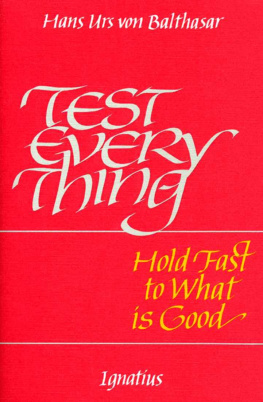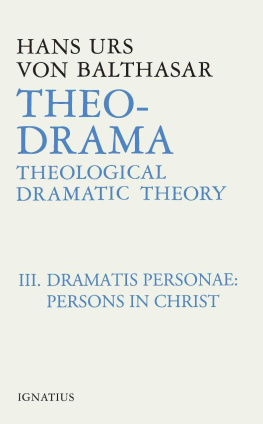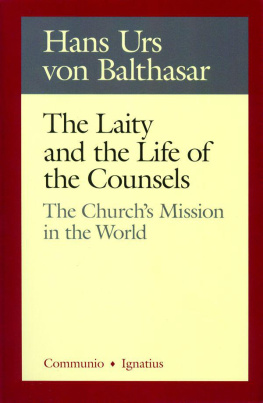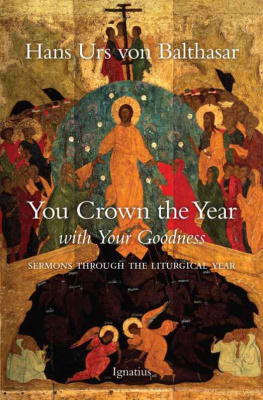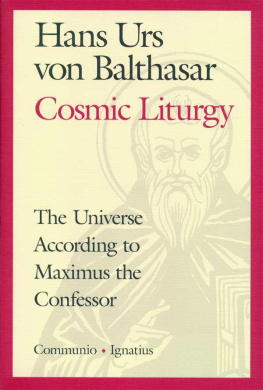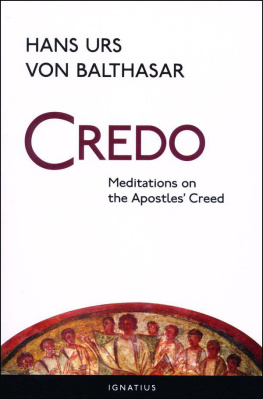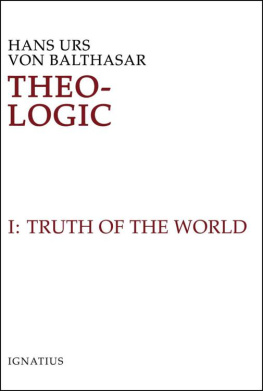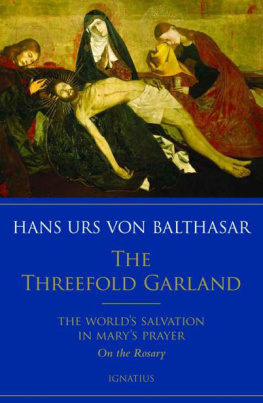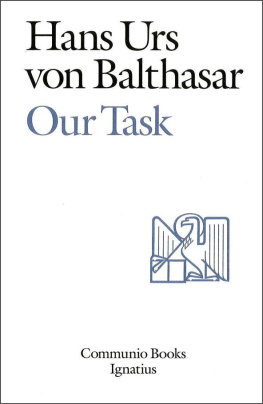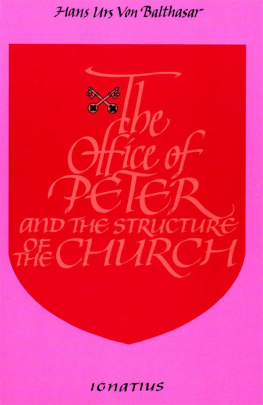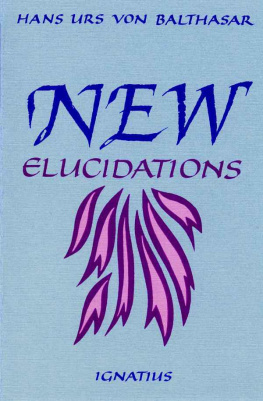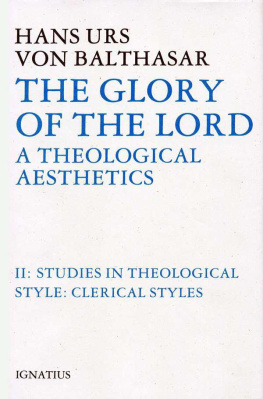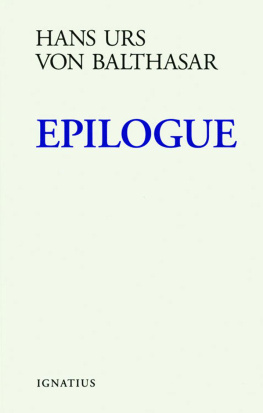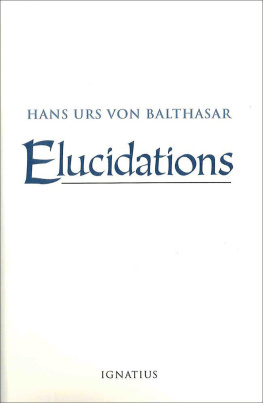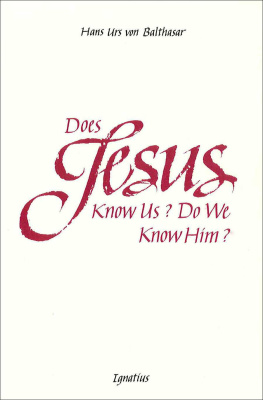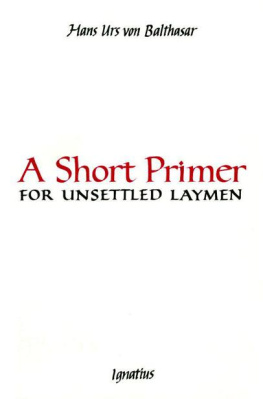Test Everything:
Hold Fast to What Is Good
Test Everything:
Hold Fast to What Is Good
An Interview with
HANS URS VON BALTHASAR
by Angelo Scola
Translated by Maria Shrady
IGNATIUS PRESS SAN FRANCISCO
Title of the German original:
Prfet allesdas Gute behaltet
1986 Schwabenverlag AG, Ostfildern
Stuttgart, Germany
Cover by Victoria Hoke Lane
With ecclesiastical approval
1989 Ignatius Press, San Francisco
All rights reserved
ISBN 978-0-89870-196-8
Library of Congress catalogue number 87-80660
Printed in the United States of America
Contents
Foreword
To be interviewed by a good friendand Don Angelo Scola certainly is such a oneis both pleasure and pain. Pleasure, because one can speak directly from the heart, touching upon ones deepest concerns, and pain, because it has to be done in such a brief and hence imprecise manner. One would like to dwell on every question, reflect on it, add nuance here or there, formulate it more intricately than it may actually emerge. But time presses on, and once again one is faced with an entirely different problem. Well, perhaps something like an image may unexpectedly arise from such a colorful mosaic. One hopes it will not be a merely subjective image of the speaker but, across the diversity of his views, an objective one of that hour now facing the Church. Much will have to be said that sounds harsh; may I be pardoned for this and may it be attributed to my shortsightedness. Or, if you will, to my age and backwardness, which show little relish for the latest novelties. Or again, to my love for a Church that has endured for two millennia, has retained her vigor throughout and thus was not born suddenly as a post-conciliar Church. This could be the true reason why some things may sound harsh: if one knows a bit about the history of the apostolic and holy Church, one measures them against her greatness, and then they appear in a format too flimsy for her catholicity. By holding such views, one risks being labeled preconciliar (as if there were such a thing) and pessimistic (which Ratzinger certainly is not; he is merely a realist). I, too, am anything but pessimistic, for the Church, assailed as she is from without and within, demonstrates by that very fact that she possesses a vitality that is unbearable for the godless world. Amidst the present din of battle, I can clearly sense this vitality, which is bursting forth with renewed life. It manifests itself in unsuspected places and in such a way that even a self-satisfied (and thus already reactionary) mentality cannot help but acknowledge it. This new life, where, according to Goethe, the new wine often acts absurdly, must then be given an ecclesiastically acceptable form by the official Church.
Let the kind reader refrain from weighing every one of my words with a gold-scale. Let him rather pick a nugget here or there, if he comes across one.
And finally, let him bear in mind that the questions raised here are viewed from an Italian perspective, reflecting the specific interests of the Church in that country.
H. U. von Balthasar
The Church in the Modern World
Angelo Scola : In 1952, you wrote a book entitled The Razing of the Bastions . In it you spoke of a Church in danger of seeing herself as an entrenched fortress. What prompted you to suggest that she should raze her bastions?
Hans Urs von Balthasar : It was the realization that Jesus intended the Church to be essentially missionary in character, a community with a centrifugal movement, not a people enclosed in itself. This makes her so different from Israel, which is not a missionary but a centripetal people, adhering to itself, far more so than any other people on earth. For Israel the movement of salvation consists in the gathering of the diaspora, in the retrieving of exiles from the remote corners of the earth into the holy, ancestral land. The Church, on the other hand, lives by her mission, as expressed in the closing chapter of Saint Matthew: Go out into the world, to all nations. That in no way contradicts her nature, which is grounded in mysterium , nor does it run counter to the eucharistic mystery in her midst. The Eucharist, however, may be celebrated anywhere in the world, in an African hut or in an Eskimos igloo, and wherever it occurs is a holy land. One can point to texts in the Church Fathers where they rejoice in the fact that there exists no other holy land than the world in its totality, for Jesus, the Risen One, is everywhere present. This openness of the Church, her mystery notwithstanding, stands in contradiction to the erection of earthly bastions and makes the apostolic movement less believable to people who perceive this contradiction.
Perhaps I should take a look at my own past for a moment, in order to throw some light on the perspective of the fifties. The old Lucerne family into which I was born did indeed possess a liberal ancestor or two (one was even placed on the Index), but my parents were so instinctively Catholic, as if nothing more natural existed in the whole world. (And I for my part must confess that the same was true for me.) An equally serene Catholic atmosphere pervaded the colleges I attended: the Benedictines at Engelberg during the First World War, of which we students, aside from the bad cooking, were largely unaware. The same was true of the Jesuit College in Feldkirch, where my friends and I were deeply engaged in aesthetic and literary studies. I continued these studies during my university years, particularly in Zurich and Vienna and for one semester in Berlin, where I was exposed to quite different perspectives. In Vienna I became fascinated with Plotinus, and there was, of course, the inevitable encounter with depth-psychology and the Freudian circles. I found myself intensely moved by the impassioned pantheism of Mahler; Nietzsche, Hofmannsthal and George entered my vision, as did the doomsday pessimism of Karl Krausthe unmistakable decadence of a declining culture. As a result of my Germanic studies, I attempted to elucidate these thousands of phenomena from a Christian point of view in a (quite inadequate) dissertation entitled The History of the Eschatological Problem in German Literature . From this evolved Apocalypse of the German Soul , my first book as a Jesuit, in which I tried to listen to the heartbeat of the great German poets and philosophers, ranging from Lessing, Herder, Kant, Goethe and Schiller to the German Idealists, and on to the central figure of Nietzsche, flanked by Kierkegaard and Dostoyevski, and across the Existentialist philosophers to Scheler, Karl Barth and Bloch. Hence the word apocalypse .
In the meantime I had entered the Society of Jesus. My philosophy professor was Erich Przywara, an excellent and unrelenting mentor. He forced one patiently to read scholastic philosophy and to engage at the same time (as he did) in modem thought. We had to confront Augustine and Aquinas with Hegel, Scheler and Heidegger. Later on, when I did my theology in Lyons, I encountered another dualism: no mention was ever made during lectures of a nouvelle thologie (I am wondering to this day how such a myth could have been invented for poor Fourvire!), but fortunately Henri de Lubac was in residence, and he referred us beyond scholasticism to the Church Fathers, generously making his notes and excerpts available to us. So it came about that while the others were playing soccer, I studied with Danilou, Bouillard and a number of others (Fessard was no longer there), and I wrote books about Origen, Gregory of Nyssa and Maximus. During vacations I went to Munich in order to append a chapter to my German work. At one time it was Jean Paul, at another Hegel. During my years in Lyons I discovered the great French poets Claudel, Pguy and Bernanosthey have been my indispensable companions ever since. I translated Claudels Satin Slipper at least five times before it reached its final version. (The first performance was in Zurich, in German, before the Parisian premiere.) On the Christian element in Bernanos I wrote a hefty volume, and I translated whatever was translatable of Pguy. Alas, Eve and Tapisseries were not in that category, but Corneilles Polyeucte , which Pguy considered the most important work in French literature, describes in detail the encounter of Christianity and culture as envisaged by him and also by me.
Next page
